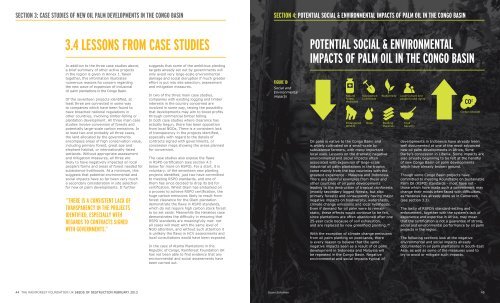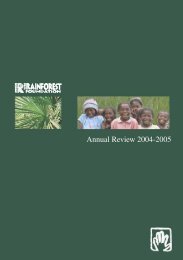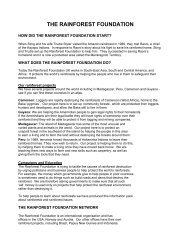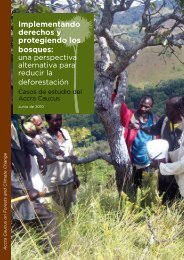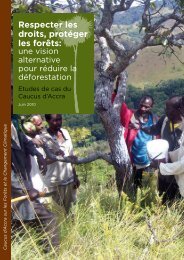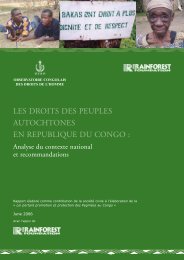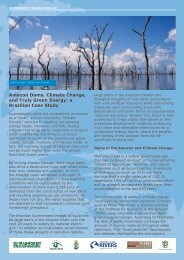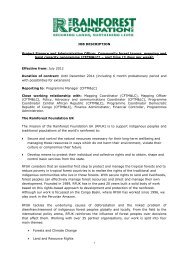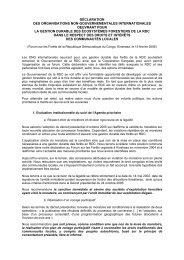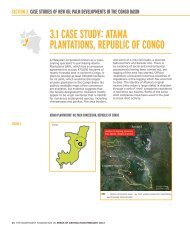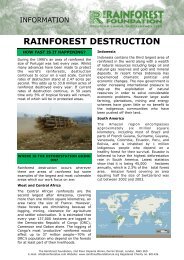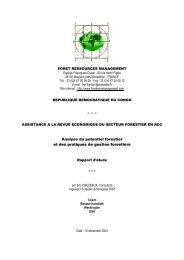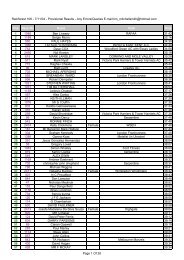Seeds of Destruction - Rainforest Foundation UK
Seeds of Destruction - Rainforest Foundation UK
Seeds of Destruction - Rainforest Foundation UK
You also want an ePaper? Increase the reach of your titles
YUMPU automatically turns print PDFs into web optimized ePapers that Google loves.
SECTION 3: CASE STUDIES OF NEW OIL PALM DEVELOPMENTS IN THE CONGO BASIN<br />
SECTION 4: POTENTIAL SOCIAL & ENVIRONMENTAL IMPACTS OF PALM OIL IN THE CONGO BASIN<br />
3.4 LESSONS FROM CASE STUDIES<br />
In addition to the three case studies above,<br />
a brief summary <strong>of</strong> other active projects<br />
in the region is given in Annex 1. Taken<br />
together, this information illustrates<br />
numerous reasons for concern regarding<br />
the new wave <strong>of</strong> expansion <strong>of</strong> industrial<br />
oil palm plantations in the Congo Basin.<br />
Of the seventeen projects identified, at<br />
least three are connected in some way<br />
to companies which have been found to<br />
have breached national regulations in<br />
other countries, involving timber-felling or<br />
plantation development. All three main case<br />
studies involve conversion <strong>of</strong> forests and<br />
potentially large-scale carbon emissions. In<br />
at least two and probably all three cases,<br />
the land allocated by the governments<br />
encompass areas <strong>of</strong> high conservation value,<br />
including primary forest, great ape and<br />
elephant habitat, or internationally-listed<br />
wetlands. Without appropriate assessment<br />
and mitigation measures, all three are<br />
likely to have negatively impacted on local<br />
people’s farms and areas <strong>of</strong> forest needed for<br />
subsistence livelihoods. At a minimum, this<br />
suggests that potential environmental and<br />
social impacts have so far been very much<br />
a secondary consideration in site selection<br />
for new oil palm developments. It further<br />
“There is a consistent lack <strong>of</strong><br />
transparency in the projects<br />
identified, especially with<br />
regards to contracts signed<br />
with governments.”<br />
suggests that some <strong>of</strong> the ambitious planting<br />
targets already set out by governments will<br />
only avoid very large-scale environmental<br />
damage and social disruption if much greater<br />
effort is put into site selection, assessment<br />
and mitigation measures.<br />
In two <strong>of</strong> the three main case studies,<br />
companies with existing logging and timber<br />
interests in the country concerned are<br />
involved in some way, raising the possibility<br />
that developments may aim to boost pr<strong>of</strong>its<br />
through commercial timber felling.<br />
In both case studies where clearance has<br />
actually begun, there has been opposition<br />
from local NGOs. There is a consistent lack<br />
<strong>of</strong> transparency in the projects identified,<br />
especially with regard to the details <strong>of</strong><br />
contracts signed with governments, or<br />
concession maps showing the areas planned<br />
for conversion.<br />
The case studies also expose the flaws<br />
in RSPO certification (see section 4.3<br />
below for more on RSPO). For a start, it is<br />
voluntary: <strong>of</strong> the seventeen new planting<br />
projects identified, just two have committed<br />
to meeting RSPO standards, and one <strong>of</strong><br />
them has since decided to drop its bid for<br />
certification. Whilst Olam has embarked on<br />
a process to achieve RSPO certification, the<br />
huge carbon emissions likely to result from<br />
forest clearance for the Olam plantation<br />
demonstrate the flaws in RSPO standards,<br />
which do not require high carbon stock forest<br />
to be set aside. Meanwhile the Herakles case<br />
demonstrates the difficulty in ensuring that<br />
RSPO standards are meaningfully met: not<br />
all cases will meet with the same level <strong>of</strong><br />
NGO attention, and without such attention it<br />
is unlikely the flaws in HCV assessments and<br />
local consultations would have been exposed.<br />
In the case <strong>of</strong> Atama Plantations in the<br />
Republic <strong>of</strong> Congo, <strong>Rainforest</strong> <strong>Foundation</strong> <strong>UK</strong><br />
has not been able to find evidence that any<br />
environmental and social assessments have<br />
been carried out.<br />
FIGURE 10<br />
Social and<br />
Environmental<br />
impacts<br />
POTENTIAL SOCIAL & ENVIRONMENTAL<br />
IMPACTS OF PALM OIL IN THE CONGO BASIN<br />
Natural<br />
Forest<br />
Medicines<br />
Endangered<br />
Wildlife<br />
Subsistence<br />
Livelihoods<br />
Water<br />
Biodiversity<br />
Building<br />
Materials<br />
Oil palm is native to the Congo Basin and<br />
is widely cultivated on a small-scale by<br />
subsistence farmers, with many important<br />
local uses. Lessons on the dramatic negative<br />
environmental and social impacts <strong>of</strong>ten<br />
associated with expansion <strong>of</strong> large-scale<br />
industrial oil palm plantations in the tropics<br />
come mainly from the two countries with the<br />
greatest experience - Malaysia and Indonesia.<br />
There are plentiful examples from these and<br />
other countries <strong>of</strong> oil palm developments<br />
leading to the destruction <strong>of</strong> tropical rainforests<br />
(mostly secondary logged forests, but also<br />
primary forests) and consequently having major<br />
negative impacts on biodiversity, watersheds,<br />
climate change emissions and local livelihoods.<br />
Even if demand for oil palm were to remain<br />
static, these effects would continue to be felt,<br />
since plantations are <strong>of</strong>ten abandoned after one<br />
25-year cycle because <strong>of</strong> soil exhaustion,<br />
and are replaced by new greenfield planting. 191<br />
With the exception <strong>of</strong> climate change emissions<br />
from oil palm planting on peat-lands, there<br />
is every reason to believe that the same<br />
negative impacts seen as a result <strong>of</strong> oil palm<br />
development in Indonesia and Malaysia will<br />
be repeated in the Congo Basin. Negative<br />
environmental and social impacts typical <strong>of</strong><br />
Local Culture and<br />
people’s land rights<br />
Food<br />
Security<br />
Carbon Dioxide<br />
developments in Indonesia have already been<br />
well documented at one <strong>of</strong> the most advanced<br />
new oil palm developments in Africa, Sime<br />
Darby’s concession in Liberia. Some impacts are<br />
also already beginning to be felt at the handful<br />
<strong>of</strong> new Congo Basin oil palm developments<br />
which have already broken ground.<br />
Though some Congo Basin projects have<br />
committed to meeting Roundtable on Sustainable<br />
Palm Oil (RSPO) standards - most have not -<br />
those which have made such a commitment may<br />
change their minds when faced with difficulties,<br />
as Herakles has already done so in Cameroon<br />
(see section 3.3).<br />
The laxity <strong>of</strong> RSPO’s standard-setting and<br />
enforcement, together with the system’s lack <strong>of</strong><br />
experience and expertise in Africa, may mean<br />
that the certification is not a guarantee <strong>of</strong> strong,<br />
social and environmental performance by oil palm<br />
projects in the region.<br />
The following sections look at the negative<br />
environmental and social impacts already<br />
documented in oil palm plantations in South-East<br />
Asia, as well as some <strong>of</strong> the measures used to<br />
try to avoid or mitigate such impacts.<br />
44 THE RAINFOREST FOUNDATION <strong>UK</strong> SEEDS OF DESTRUCTION FEBRUARY 2013 Susan Schulman<br />
45


